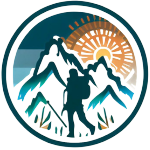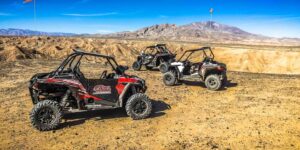Yes, camping in the desert is possible. Desert camping requires planning and specialized gear for safety and comfort.
Camping in the desert can be a unique and incredible experience, but it requires preparation and the right equipment to ensure a safe and comfortable trip. Before embarking on your desert camping adventure, you should research the area, understand the climate, and pack accordingly.
Some essential items to pack include a sturdy tent, sleeping bags, and plenty of water. Additionally, it’s crucial to be aware of the potential hazards, such as extreme temperatures, venomous animals, and flash floods. With proper planning and caution, camping in the desert can be a once-in-a-lifetime experience.

Credit: www.viator.com
What Is Desert Camping And Why It’S So Thrilling
Definition Of Desert Camping
Desert camping refers to camping in a desert environment where the climate is extremely hot and dry, and the landscape is generally composed of sand and rock formations. It can be an exciting opportunity to test your survival skills and discover the unique natural beauty of the desert.
It is an activity that is gaining popularity, especially among adventure enthusiasts and nature lovers.
Here are some key points to remember about desert camping:
- It involves setting up camp in a remote location that is far away from civilization.
- It often requires carrying your own food, water, and other necessary supplies.
- Depending on the location, the weather conditions can be extreme, with temperatures soaring during the day and dropping significantly at night.
- It is important to take precautions such as using sunscreen, wearing protective clothing, and staying hydrated.
Why People Are Attracted To Desert Camping
Desert camping offers a unique opportunity to experience the natural environment that is vastly different from what we are used to in our daily lives. Here’s why people are attracted to desert camping:
- The stunning landscape: Deserts have some of the most beautiful and unique landscapes in the world, which is a major draw for nature enthusiasts. The sand dunes, rock formations, and vast emptiness of the desert offer an otherworldly experience that can be truly breathtaking.
- The adventure: Desert camping can be a thrilling and adventurous experience. It offers an opportunity to disconnect from the noise and pace of daily life, challenge yourself physically and mentally, and discover your inner strength and resilience.
- The solitude: For those seeking peace and quiet, desert camping is an ideal way to enjoy the solitude and stillness that can be difficult to find in our modern world.
- The stargazing: The clear, dark skies of the desert make it an ideal location for stargazing. Without the light pollution of cities and towns, the stars can be seen in their full glory.
What Makes Desert Camping Different Than Traditional Camping
Although both types of camping involve spending time outdoors, desert camping is vastly different from traditional camping in many ways. Here’s what sets them apart:
- Location: Traditional camping is often done in forests, mountains, or near bodies of water, while desert camping is done in arid regions without much vegetation or water.
- Climate: The climate of the desert is harsh, with extremely hot temperatures during the day and significant drops in temperature at night. Traditional camping can be done in milder climates or during specific seasons.
- Supplies: Desert camping requires more preparation and self-sufficiency than traditional camping because of the remoteness of the location. Campers need to bring their own food, water, and supplies, as there are no nearby stores or sources of water.
- Wildlife: The wildlife in the desert is different from the wildlife found in traditional camping locations. Campers need to be aware of the dangers posed by snakes, scorpions, and other desert creatures. Traditional camping usually involves encountering more common wildlife such as bears or deer.
Desert camping offers a unique opportunity for adventure and self-discovery. It requires planning, preparation, and self-sufficiency but can be an unforgettable experience for those willing to take on the challenge.
The Essentials Of Desert Camping: Tips And Tools You Need
Camping in the desert is an experience like no other. The peacefulness and solitude amid miles of uninhabited landscapes create a truly unique experience that you won’t find anywhere else. However, desert camping can be daunting without the right tools and knowledge.
Here are some essential tips and tools you need for making the most of your camping trip in the desert.
Necessary Gear And Equipment For Desert Camping
Before packing your bags and heading out, make sure you take the following essential gear and equipment for desert camping:
- A tent or a camping hammock: A sturdy, reliable shelter is a must for desert camping. Make sure your tent has enough ventilation to keep you cool during the day. An alternative to a tent is camping in a hammock.
- Sleeping bags and pads: It gets cold at night in the desert, so be sure to bring a warm and cozy sleeping bag to ensure you get a good night’s sleep.
- Water: One of the most crucial things to bring when camping in the desert is plenty of water. Plan to bring at least a gallon per person per day.
- Food: Bring non-perishable food items that don’t require refrigeration or cooking. Foods that are high in protein and carbohydrate are good options for providing energy and nutrients.
- Sun protection: Sunscreen, hats, sunglasses, and lightweight long-sleeve shirts are a few ways to protect yourself from the sun’s harsh rays.
What To Pack For Desert Camping
When packing for your desert camping trip, keep the following items in mind:
- Clothing: Pack lightweight, breathable, and loose-fitting clothes to stay comfortable in the desert’s hot and dry climate.
- Portable stove or fuel: A portable stove or fuel can come in handy if you want to cook meals or heat up water for tea or coffee.
- First aid kit: Be prepared for any minor injuries or illnesses with a well-stocked first aid kit.
- Maps and navigation tools: The desert can be disorienting, so make sure to bring maps, compasses, or gps devices so that you don’t get lost.
- Lighting equipment: Bring a headlamp, flashlight, or lantern to help you navigate around your campsite at night.
Setting Up Your Campsite In The Desert
When looking for a location to set up your campsite, keep the following tips in mind:
- Choose a spot that is at least 200 feet away from any water sources to avoid damaging fragile ecosystems.
- Look for flat ground to put your tent on and avoid low lying areas that can accumulate water in case of a sudden storm.
- Use rocks to anchor your tent in place and avoid staking it directly into the ground.
- Keep your campsite tidy and minimize your impact on the fragile desert ecosystem by packing up your trash and waste and leaving your campsite how you found it.
By following these tips and packing the right gear, you can have an unforgettable camping experience in the desert. So, start planning your adventure today and get ready to immerse yourself in the stark beauty of the desert landscape!
Safety Tips For Desert Camping: Keep Yourself Safe From Extreme Conditions
Camping In The Desert: Staying Safe From Extreme Conditions
Camping in the desert can be an exciting and fun adventure, but it comes with its own unique set of challenges and potential dangers. In order to have a safe and enjoyable experience, it is important to be prepared and to know how to protect yourself.
Here are some essential safety tips for desert camping:
Staying Hydrated And Tips For Water Management:
- The most crucial aspect of desert camping is staying properly hydrated. It is recommended that you drink at least 1 gallon of water per person per day.
- It’s also important to conserve water to make sure you have enough for your entire trip. Some tips for water management include:
- Bring enough water with you for your entire trip and carry extra water in case of emergency.
- Find shade or create shade during the day to reduce water loss from sweating.
- Cook and clean with minimal water using wet wipes or sanitizing gel instead.
Dealing With The Heat: Protecting Yourself From Sunburn And Sunstroke:
- The heat in the desert can be extremely intense during the day and, if not properly addressed, can lead to sunburn and sunstroke. Some tips for dealing with the heat include:
- Wearing light-colored, loose-fitting clothing to reduce heat absorption and promote ventilation.
- Wearing a hat and sunglasses to protect your face and eyes from the sun.
- Taking frequent breaks in the shade or in an air-conditioned area to rest and cool down.
- Applying sunscreen with a minimum spf of 30 to all exposed skin.
Dealing With Desert Wildlife: Staying Safe Around Animals:
- The desert is home to a variety of wildlife, including snakes, scorpions, spiders, and coyotes. To stay safe around these animals, you should:
- Avoid walking or camping near animal burrows or dens.
- Keep your campsite clean and free of food scraps and garbage that might attract wildlife.
- Wear protective clothing and footwear, such as boots and gloves.
- Familiarize yourself with the types of wildlife that are common in the area you will be camping in.
Protecting Yourself From Desert Diseases: Health Risks In The Desert:
- There are several health risks associated with desert camping, including heat exhaustion, dehydration, and insect bites. Here are some ways to protect against them:
- Be aware of signs of heat exhaustion and dehydration, such as nausea, dizziness, and dry mouth. Seek medical help immediately if you experience these symptoms.
- Wear long sleeves and pants to protect against insect bites.
- Use insect repellent and mosquito netting to protect against mosquitoes and other biting insects.
- Bring a first aid kit that includes medication for common health issues, such as pain relievers and antihistamines.
Desert camping can be a challenging but rewarding experience if you are properly prepared and equipped to handle the unique conditions of the desert environment. By following these safety tips, you can ensure that your trip is both safe and enjoyable.
Frequently Asked Questions On Can You Camp In The Desert
Can You Camp In The Desert Without A Tent?
Yes, you can camp in the desert without a tent, but it’s risky. You might encounter some dangers, such as insects, snakes, scorpions, and windstorms.
What Are The Things To Consider When Camping In The Desert?
Before you go camping in the desert, you need to consider the climate, time of the year, and location. You also need to plan for water, food, and shelter.
How Do You Stay Safe When Camping In The Desert?
To stay safe when camping in the desert, bring enough water, wear sunscreen and lightweight clothing, and avoid hiking during peak heat hours. You should also have a communication device in case of emergencies.
Conclusion
As we come to the end of this blog post, we’ve explored the various aspects of camping in the desert. It’s evident that while a lot of preparation is required, a desert camping experience can be one of the most rewarding adventures for any camper.
However, it’s important to keep in mind that the desert is a fragile ecosystem, and we must do our part to preserve it. Practice leave no trace principles, respect wildlife, and always keep safety in mind. Before setting up camp, research the area thoroughly, and know the rules and regulations.
With careful planning and preparation, camping in the desert can be an unforgettable experience. We hope that you found this guide informative and helpful and have inspired you to prepare for a desert camping adventure of your own. Happy camping!




